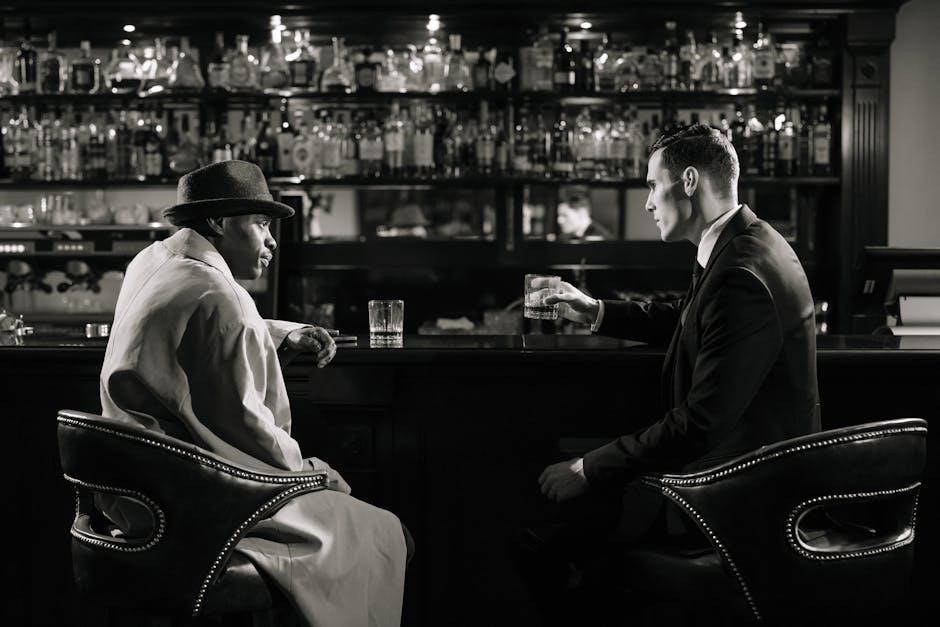Trevor Noah’s memoir, Born a Crime, is a powerful account of his upbringing in apartheid South Africa, blending humor and poignancy to explore race, identity, and resilience․
What is “Born a Crime” about?
Born a Crime is a memoir by Trevor Noah, recounting his childhood in apartheid South Africa․ Born to a black mother and white father, his existence was illegal under apartheid laws․ The book explores his experiences growing up in a society divided by race, his struggles with identity, and the resilience he developed․ Noah uses humor and poignant storytelling to shed light on the cultural and societal challenges he faced, offering a unique perspective on race, identity, and survival in a deeply divided world․
Trevor Noah’s memoir and its significance
Born a Crime is a deeply personal and impactful memoir that highlights Trevor Noah’s unique experiences growing up in apartheid South Africa․ The book not only chronicles his childhood but also provides a vivid portrayal of the societal norms and institutionalized racism of the time․ Noah’s storytelling blends humor with raw honesty, making the memoir both entertaining and thought-provoking․ Its significance lies in its ability to shed light on the complexities of race, identity, and resilience, resonating with readers worldwide and cementing its place as a modern literary classic․
Synopsis of “Born a Crime”
Born a Crime recounts Trevor Noah’s childhood in apartheid South Africa, where his biracial existence was illegal․ It explores his struggles, adventures, and his mother’s unwavering support․
Trevor Noah’s childhood in apartheid South Africa
Trevor Noah was born in 1984 to a black Xhosa mother, Patricia, and a white Swiss father, an illegal union under apartheid laws․ His early life was marked by secrecy and hiding to avoid persecution․ Patricia played a pivotal role, teaching Trevor multiple languages and instilling resilience․ Despite the oppressive regime, Trevor’s humor and adaptability helped him navigate a world where his existence was criminalized․ His experiences reflect the harsh realities of apartheid and the strength of his mother’s guidance․
The illegal nature of his existence
Trevor Noah’s birth was a crime under apartheid laws, as his mother, a black Xhosa woman, and father, a white Swiss man, engaged in an illegal interracial relationship; The apartheid regime forbade such unions, making Trevor’s existence illegal․ His mother faced severe risks, and Trevor was often hidden to avoid detection․ This illegality shaped his early life, emphasizing the oppressive nature of the apartheid system and its rigid racial segregation․ His story underscores the inhumanity of laws that criminalized love and identity․
His mother’s role in his upbringing
Trevor Noah’s mother, Patricia Nombuyiselo Noah, played a pivotal role in his upbringing despite the challenges of apartheid․ She was fiercely protective, ensuring his safety in a society that criminalized his existence․ Patricia instilled in Trevor a strong sense of identity and resilience, teaching him multiple languages and exposing him to diverse cultures․ Her unwavering support and religious faith helped shape Trevor’s worldview, equipping him to navigate the complexities of a deeply divided society․ Her influence was central to his survival and growth․

Themes in “Born a Crime”
Central themes include resilience, religion, and institutionalized racism, highlighting hope and redemption amidst adversity, offering profound insights into South Africa’s complex social fabric and human spirit․
Race and identity
Trevor Noah’s memoir delves deeply into the complexities of race and identity, shaped by his biracial heritage in apartheid South Africa․ As the son of a black Xhosa mother and a white Swiss father, Noah’s existence was illegal under apartheid laws, making him a literal “crime․” His experiences navigating multiple racial groups, from black townships to white neighborhoods, highlight the absurdities and dangers of institutionalized racism․ Noah’s journey explores how race shaped his sense of self, often leaving him feeling like an outsider in both worlds․ His mother’s unwavering guidance played a pivotal role in helping him embrace his identity, despite the societal constraints․ Through humor and raw honesty, Noah illustrates the internal and external conflicts of growing up biracial in a deeply divided society, offering a poignant reflection on race, belonging, and resilience․
Resilience and survival
Trevor Noah’s memoir vividly portrays his resilience and survival in apartheid South Africa․ Born into a society where his existence was criminalized, Noah faced constant threats and challenges․ His mother, Patricia, played a pivotal role in his survival, teaching him to navigate the dangers of racism and oppression․ Despite the odds, Noah learned to adapt, using humor and wit to cope with adversity․ His journey highlights the strength of the human spirit, as he transformed his struggles into opportunities for growth and understanding․
Religion and its influence
Religion plays a significant role in Trevor Noah’s life, shaping his worldview and providing solace amid adversity․ His mother, Patricia, a deeply religious woman, instilled in him a strong faith that served as a moral compass․ Noah recounts attending various churches, from a modern megachurch to traditional black churches, where he observed differing religious practices․ These experiences exposed him to diverse cultural expressions of faith, highlighting its unifying and divisive aspects․ Religion became a source of hope and guidance, influencing his resilience and perspective on life․
Institutionalized racism
In Born a Crime, Trevor Noah vividly portrays the oppressive reality of institutionalized racism under apartheid; His existence as a mixed-race child was criminalized, highlighting the systemic discrimination embedded in South African laws․ Noah recounts how these laws enforced segregation and perpetuated inequality, shaping his early understanding of race and identity․ The memoir underscores the profound impact of institutionalized racism on individuals and society, revealing how it created a deeply divided and unjust world․ Noah’s experiences illustrate the enduring legacy of such systems․

Key Characters
Trevor Noah: The protagonist, navigating a complex childhood under apartheid․ Patricia Nombuyiselo Noah: Trevor’s resilient mother, central to his upbringing․ Robert Noah: Trevor’s distant Swiss father․ Abel: Trevor’s strict stepfather, shaping his early life experiences․
Trevor Noah
Trevor Noah, the protagonist, narrates his extraordinary journey growing up in apartheid South Africa․ Born to a black mother and white father, his existence was illegal under oppressive laws․ His story explores themes of identity, race, and resilience as he navigates a world where he never fully belonged․ With humor and vulnerability, Noah recounts his childhood struggles, highlighting the influence of his mother, Patricia, who shaped his perspective and strength․ His experiences laid the foundation for his future as a comedian and storyteller, offering a unique lens on systemic racism and hope․
Patricia Nombuyiselo Noah (Trevor’s mother)
Patricia Nombuyiselo Noah, Trevor’s mother, is a central figure in his memoir․ A strong, independent black Xhosa woman, she defied apartheid laws by loving a white man, making Trevor’s birth illegal․ Her resilience and unwavering faith shaped Trevor’s early life, teaching him to navigate a world of racial divides․ Despite facing immense challenges, Patricia instilled in Trevor a sense of self-worth and determination, becoming his guiding force․ Her influence is deeply intertwined with Trevor’s journey of identity and survival․
Robert Noah (Trevor’s father)
Robert Noah, Trevor’s father, was a white Swiss man who engaged in an illegal interracial relationship with Trevor’s mother during apartheid․ His absence in Trevor’s life left a void, shaping Trevor’s struggles with identity and belonging․ Despite the distance, Robert’s influence is felt through Trevor’s reflections on his dual heritage and the societal barriers that kept them apart․ His role in Trevor’s life underscores the complexities of family and race under oppressive regimes․
Abel (Trevor’s stepfather)
Abel, Trevor’s stepfather, played a complex role in his life․ A strict, often abusive figure, Abel imposed harsh religious and disciplinary standards on Trevor and his mother․ His controlling behavior created tension, particularly due to Trevor’s mixed heritage, which Abel struggled to accept․ Despite his flaws, Abel’s presence shaped Trevor’s understanding of authority and resilience․ Trevor’s mother, Patricia, often mediated, protecting her son while navigating the challenges of their household․ Abel’s influence, though fraught, remains a significant part of Trevor’s formative experiences․
Highlights of the Book
Trevor’s experiences with different churches, his struggles with identity, and humorous yet poignant storytelling highlight the memoir’s unique blend of personal and cultural insights․
Trevor’s experiences with different churches
Trevor recounts attending various churches, from a mixed congregation megachurch to a white church focused on deep scripture analysis and a black church with lengthy, spirited services․ These experiences highlight his exposure to diverse cultural practices and religious expressions․ One Sunday, his mother’s car breaks down on the way to church, showcasing the challenges of everyday life․ These stories illustrate Trevor’s unique upbringing and his mother’s efforts to broaden his understanding of faith and identity in a divided society․
His struggles with identity and belonging
Trevor’s mixed heritage left him feeling like an outsider in both black and white communities․ As a biracial child in apartheid South Africa, he struggled to find his place, often facing rejection from both groups․ His mother’s guidance helped him navigate these challenges, teaching him to embrace his uniqueness․ Trevor’s journey of self-discovery highlights the complexities of identity and the search for belonging in a deeply divided society, ultimately shaping his perspective on race and culture․
Humorous yet poignant storytelling
Trevor Noah masterfully blends humor with heartfelt reflections in Born a Crime․ His anecdotes, such as the car trouble on the way to church, showcase his ability to find lightness in difficult situations․ Noah’s storytelling balances laughter with profound insights into apartheid’s brutality and his personal struggles․ This unique narrative style makes the heavy themes of race, identity, and resilience both relatable and engaging, leaving readers moved and reflective long after the final page․

Literary Analysis
Trevor Noah’s memoir offers a vivid narrative style, blending personal anecdotes with cultural and historical context, while exploring themes of hope and redemption through his unique voice․

Narrative style and structure
Trevor Noah’s Born a Crime is structured as a series of vignettes, each focusing on a different aspect of his life․ His narrative style blends humor with poignant reflections, creating an engaging and accessible memoir․ Noah’s use of anecdotes allows readers to connect emotionally while exploring themes like race and identity․ The book’s non-linear structure jumps between childhood memories, cultural observations, and historical context, providing a vivid portrayal of life under apartheid․ This approach makes the memoir both personal and universally relatable, highlighting Noah’s unique voice and perspective․
Cultural and historical context
Born a Crime is deeply rooted in the cultural and historical landscape of apartheid South Africa․ Trevor Noah’s experiences reflect the oppressive laws and societal norms of the time, particularly the prohibition of interracial relationships․ The memoir highlights the stark contrasts of life under apartheid, from the rigid racial classifications to the resilience of communities․ Noah’s narrative sheds light on the historical injustices while offering a personal perspective on growing up in a divided nation, making the book a vital exploration of South Africa’s complex past․
Themes of hope and redemption
Amidst the harsh realities of apartheid, Born a Crime offers a powerful narrative of hope and redemption․ Trevor Noah’s journey from a life deemed illegal to global success underscores resilience and the human spirit’s capacity to overcome adversity․ His story, marked by humor and vulnerability, highlights the transformative power of hope, even in the face of systemic oppression․ The memoir ultimately serves as a testament to the possibility of redemption and the enduring strength of the human condition․

Book Reviews and Reception
Born a Crime received widespread critical acclaim, becoming a New York Times bestseller․ Readers praised its humorous yet poignant storytelling, resonating deeply with its themes of identity and resilience․
Critical acclaim and bestseller status
Born a Crime achieved immense success, debuting as a New York Times bestseller and receiving widespread critical acclaim․ Reviewers praised Trevor Noah’s ability to blend humor with poignant reflections on race, identity, and resilience․ The memoir’s raw honesty and unique storytelling resonated deeply with readers, solidifying its place as a modern literary masterpiece․ Its bestseller status underscored its universal appeal, making it a must-read for audiences worldwide․
Reader responses and feedback
Readers globally praised Born a Crime for its raw honesty and emotional depth․ Many connected with Trevor Noah’s journey, finding it both relatable and enlightening․ The memoir’s ability to balance humor with poignant reflections on race and identity resonated deeply․ Fans appreciated Noah’s storytelling, calling it a window into South Africa’s complex history․ The book’s universal themes of resilience and hope attracted a diverse audience, making it a cherished read across age groups and backgrounds․ Its impact continues to spark meaningful conversations worldwide․
Comparisons to other memoirs
Born a Crime is often compared to memoirs like I Know Why the Caged Bird Sings and The Diary of a Young Girl for its raw storytelling and exploration of identity․ While it shares themes of resilience with works by Malala Yousafzai, Trevor Noah’s humor and unique voice set it apart․ Readers often note its ability to balance lighthearted anecdotes with profound reflections on race and injustice, making it a standout in the memoir genre․ Its universal appeal has drawn comparisons to classic coming-of-age stories, yet its perspective remains distinctly original․
FAQs about “Born a Crime”
Is “Born a Crime” a true story?
Born a Crime is a memoir, making it a true account of Trevor Noah’s life, detailing his experiences growing up in apartheid South Africa․
Why is the book titled “Born a Crime”?
The title reflects Trevor Noah’s illegal birth under apartheid laws, as his parents’ interracial relationship was forbidden, making his existence a criminal act․
What is the main message of the book?
The memoir explores themes of race, identity, and resilience, offering a hopeful perspective on overcoming adversity and understanding the complexities of human experience․
Born a Crime is a memoir, making it a true account of Trevor Noah’s life․ It chronicles his experiences growing up in apartheid South Africa, where his birth as the child of a black mother and white father was illegal․ The book is structured around personal anecdotes, blending humor with poignant reflections on race, identity, and resilience․ Noah’s storytelling highlights the challenges of his upbringing and the lessons he learned from his mother, Patricia, who played a pivotal role in shaping his perspective․

The title reflects Trevor Noah’s illegal birth under apartheid laws in South Africa․ His mother, a black Xhosa woman, and father, a white Swiss man, engaged in an interracial relationship, which was prohibited․ The memoir’s title underscores the systemic racism and oppression Noah faced from birth, highlighting the absurdity of institutionalized segregation․ It symbolizes his existence as a direct challenge to the oppressive laws of the time, making his very being a “crime” in the eyes of the state․
The main message of Born a Crime is the power of hope, resilience, and the human spirit in the face of oppression․ Trevor Noah shares his experiences growing up under apartheid, highlighting the absurdity of institutionalized racism and the strength of his mother, who taught him to navigate a world that criminalized his existence․ The book emphasizes the importance of identity, humor, and the universal struggle for belonging, offering a poignant yet uplifting reflection on overcoming adversity․

Study Guide and Summary
Born a Crime is a memoir detailing Trevor Noah’s journey through apartheid South Africa, offering insights into race, identity, and resilience․ It became a bestseller and is now being adapted into a film․
Key plot points and analysis
Trevor Noah’s memoir, Born a Crime, recounts his illegal birth in apartheid South Africa, where interracial relationships were forbidden․ His mother, Patricia, a black Xhosa woman, defied laws to raise him despite societal hostility․ The book explores Trevor’s struggles with identity, belonging, and survival in a racially divided world․ His experiences in diverse churches and encounters with institutionalized racism highlight themes of resilience and hope․ The narrative weaves humor with poignant reflections, offering a vivid portrayal of life under apartheid and its lasting impact․

Major themes and symbols
Born a Crime explores themes of race, identity, and resilience, set against the backdrop of apartheid South Africa․ Trevor Noah’s illegal existence symbolizes the systemic oppression of interracial relationships․ His journey highlights the struggle for belonging in a racially divided world․ Religion plays a significant role, offering both comfort and conflict․ The title itself, “Born a Crime,” serves as a powerful symbol of institutionalized racism and the dehumanizing laws of apartheid, underscoring Noah’s fight for acceptance and identity in a hostile society․
Discussion questions and essay topics
How does Trevor Noah’s multiracial identity shape his sense of belonging in apartheid South Africa?
Analyze the role of humor in Noah’s storytelling and its impact on the narrative’s tone․
Discuss the significance of the title Born a Crime and its reflection of institutionalized racism․
How does Noah’s mother, Patricia, influence his resilience and worldview?
Explore the theme of religion in the memoir and its dual role as both comfort and conflict․
What lessons can be drawn from Noah’s experiences regarding race, identity, and societal norms?
How does Noah’s upbringing prepare him for his future as a global figure?
Examine the symbolism of the churches Noah attends and their representation of cultural divides․
Discuss the broader implications of apartheid laws on families and society․
How does Noah’s story contribute to conversations about race and identity today?
Adaptations and Media
Lupita Nyong’o will star in and produce the film adaptation of Born a Crime, bringing Trevor Noah’s story to the screen, generating widespread excitement and anticipation․
Film adaptation announcement
The film adaptation of Born a Crime was announced, with Lupita Nyong’o set to star and produce․ This highly anticipated project brings Trevor Noah’s memoir to life, exciting fans worldwide․
Lupita Nyong’o’s involvement
Lupita Nyong’o is set to star in and produce the film adaptation of Born a Crime․ Her involvement adds significant credibility to the project, given her acclaim as an Academy Award-winning actress․ Nyong’o’s announcement on Twitter generated excitement among fans and critics, highlighting the adaptation’s potential to resonate globally․ Her participation underscores the importance of bringing Trevor Noah’s story to the screen, ensuring its emotional depth and cultural authenticity are preserved․ This collaboration promises to elevate the memoir’s impact on a wider audience․
Reception of the adaptation news
The announcement of Lupita Nyong’o’s involvement in the film adaptation of Born a Crime was met with widespread enthusiasm․ Fans and critics alike expressed excitement, praising Nyong’o’s ability to bring depth to her roles․ The news sparked anticipation for the film, with many hoping it would capture the memoir’s emotional and cultural complexity․ Social media buzz highlighted the project’s potential to broaden the book’s reach and impact․ The adaptation is expected to resonate globally, further cementing Trevor Noah’s story in popular culture․

About the Author
Trevor Noah is a renowned comedian, writer, and former host of The Daily Show․ His memoir, Born a Crime, became a global bestseller, showcasing his unique voice and perspective․
Trevor Noah’s background and career
Trevor Noah is a South African comedian, writer, and television host, best known for hosting The Daily Show from 2015 to 2022․ Born in 1984 in Johannesburg, South Africa, Noah rose to prominence through his stand-up comedy and television appearances․ His career began in South Africa, where he worked in radio, television, and comedy before gaining international recognition․ Noah’s unique perspective and humor have made him a global figure, blending sharp commentary on politics, race, and culture․
His impact on comedy and media
Trevor Noah has significantly influenced comedy and media by bringing a unique, global perspective to audiences․ As host of The Daily Show, he redefined late-night television, blending humor with sharp commentary on politics, race, and culture․ His ability to address complex issues with wit has made him a pivotal figure in modern media, inspiring a new generation of comedians and media personalities․ Noah’s work continues to shape global conversations, cementing his legacy as a trailblazer in comedy and journalism․
Other works and projects
Beyond Born a Crime, Trevor Noah has made waves in comedy and media with his stand-up specials like Son of Patricia and Afraid of the Dark․ He also hosts The Daily Show, where he tackles global issues with humor and insight․ Noah has written articles for prominent publications and advocates for social justice․ His production company, Day Zero Productions, focuses on diverse storytelling․ He continues to expand his influence through various creative ventures and philanthropic efforts, particularly in education and healthcare in South Africa․
Trevor Noah’s Born a Crime leaves a lasting impact, offering insights into identity, resilience, and institutional racism, cementing his legacy as a storyteller and advocate․
The lasting impact of “Born a Crime”
Trevor Noah’s memoir has left an indelible mark on literature and culture, sparking global conversations about race, identity, and resilience․ Its bestseller status and film adaptation underscore its relevance․ The book’s humorous yet poignant storytelling has resonated with readers worldwide, making it a vital resource for understanding apartheid’s legacy․ Noah’s ability to weave personal struggles with broader societal issues has cemented his voice as a powerful advocate for change, ensuring Born a Crime remains a timeless and impactful read․
Trevor Noah’s legacy
Trevor Noah’s memoir, Born a Crime, has solidified his legacy as a voice for social justice and cultural understanding․ Beyond the book’s success, Noah’s career as a comedian and media personality continues to amplify marginalized stories․ His ability to blend humor with sharp commentary has made him a global influencer, inspiring conversations about race, identity, and inequality․ Through his work, Noah has become a symbol of resilience and a bridge between cultures, ensuring his impact extends far beyond the pages of his memoir․
Final thoughts on the memoir
Born a Crime leaves readers with a profound appreciation for Trevor Noah’s journey and the broader societal issues he addresses․ His ability to weave humor into harrowing experiences makes the memoir both relatable and impactful․ The book not only highlights the absurdities of apartheid but also celebrates the strength of his mother and the resilience of the human spirit․ As a bestseller and inspiration for a film adaptation, Noah’s story continues to resonate globally, sparking essential conversations about identity, race, and hope․
